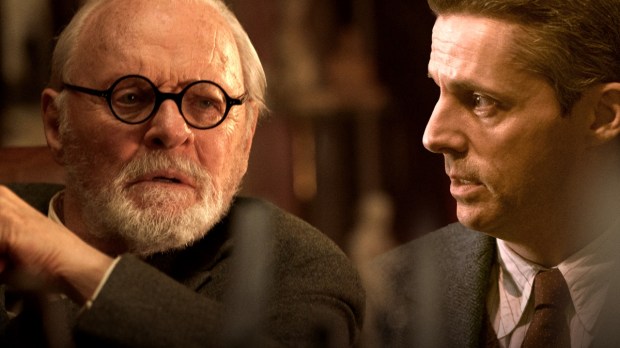Debating today seems to be a lost art. People mostly use social media to put their point of view across, and others often hide behind their screens and reply with disrespect, plain rudeness, or they give absolutely no reason or justification for their opinion.
However, while watching Freud’s Last Session — a movie that sees C.S. Lewis and Freud go head-to-head to discuss the oft-sensitive subject of God’s existence — we get a timely reminder in how to argue respectfully, as well as acknowledging the fact we’re all entitled to our own opinions.
Of course, their conversations are entirely fictional. We have no indication that Freud and Lewis ever truly spoke — though it seems that Freud did meet with an unknown Oxford professor toward the end of his life, so who knows?
What makes this imaginary meeting of two very different minds an intriguing watch is how the intellectual giants each carried a lot of suffering, and how this affected the way they got their points across using very contrasting techniques.
Two men who faced suffering
On the one hand, Hopkins gives a very powerful performance as an emotional and angry Sigmund Freud. And to be fair, he had a lot to be angry about. Not only did he have to come to England from his hometown in Austria to escape Nazi persecution, but he had to contend with an agonizing terminal cancer of the jaw.
And those were just the physical aspects of his life that he suffered in his latter years. He also had the various emotions that come with losing loved ones in terrible conditions.
However, Lewis also had his own collection of suffering to deal with, as portrayed by the wonderful Matthew Goode. Having lost his mother at an early age, he was abandoned and shipped off to a new home by his father. He then suffered further loss in World War I that shaped his life and his faith forever.
God on your side
Yet in watching the heated debate, it’s possible to see that Lewis, a man of great faith, was far more at peace in his mind than Freud, who furiously denied God’s existence. And despite all of Freud’s objections, and at times reasoned argument, Lewis seemed to come out of the debate with the upper hand.
And here are the takeaways from Lewis’ character that would be useful for many of us to adopt today:
1
Remain polite
That is often easier said than done! However, Lewis was respectful of his host’s condition, surroundings, and age. Even when Freud was at his angriest, Lewis was able to remain mannerly and gave him the space to speak. And most importantly, he listened.
2
Don’t take things personally
Again, not always a natural thing to do. In the movie Freud attacks something so dear to Lewis’ heart — his love of God — and yet the writer was able to appreciate that the source of Freud’s beliefs was the psychoanalyst’s own experience and research, and nothing to do with Lewis himself.
3
Prepare your comebacks
It helps that Lewis was a man of great intelligence and knowledge, but he was often able to rebuff Freud’s assertions with his own powerful thoughts and reflections that were fully justified and researched.
4
Know when to stay quiet
At times during the debate Freud is ranting so much that he leaves Lewis speechless. And that is perhaps a cue to remain quiet. Pick your battles and know when silence is your most powerful weapon.
5
Find the humor
Having a laugh is one of the best ways to defuse a situation. When things got really heated, a little joke or witticism really allowed the conversation to move on with a lighter tone.
6
Respect each other
Considering the passion both men had in their beliefs, they respected each other’s opinions. They didn’t belittle each other, but seemed to admire the fact they actually had such fervent ideas in the first place. And at the film’s end, they separate almost as friends.



